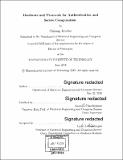| dc.contributor.advisor | Anantha Chandrakasan. | en_US |
| dc.contributor.author | Juvekar, Chiraag (Chiraag Shashikant) | en_US |
| dc.contributor.other | Massachusetts Institute of Technology. Department of Electrical Engineering and Computer Science. | en_US |
| dc.date.accessioned | 2018-09-17T15:57:15Z | |
| dc.date.available | 2018-09-17T15:57:15Z | |
| dc.date.copyright | 2018 | en_US |
| dc.date.issued | 2018 | en_US |
| dc.identifier.uri | http://hdl.handle.net/1721.1/118094 | |
| dc.description | Thesis: Ph. D., Massachusetts Institute of Technology, Department of Electrical Engineering and Computer Science, 2018. | en_US |
| dc.description | Cataloged from PDF version of thesis. | en_US |
| dc.description | Includes bibliographical references (pages 149-162). | en_US |
| dc.description.abstract | The Internet of Things has resulted in an exponential rise in the number of embedded electronic devices. This thesis deals with ensuring the security of these embedded devices. In particular we focus our attention on two problems: first we look at how these devices can convince another of their identity i.e. authentication and second we look at how these devices and cloud servers can compute joint functions of their private inputs while revealing nothing but the computation results to the other i.e. secure computation. We start with the problem of counterfeit detection through electronic tagging. Physical access to electronic tags can be leveraged to mount side-channel and fault injection attacks. We design a new tagging solution that leverages ferro-electric capacitor based non volatile memory to addresses these issues. Next we note that resource constraints imposed by embedded devices often preclude the use of public-key cryptography. We address this issue through the development of a lightweight (10k-Gate) Elliptic Curve accelerator for the K-163 curves, which allows us to build a secure wireless-charging system that can block power from counterfeit and potentially dangerous chargers. Next we build upon these insights to develop a new authentication protocol which combines the leakage resilience and public-key authentication properties of our previous tagging solutions. We implement this bilinear pairing based protocol on a RISCV processor and demonstrate its practicality in an embedded environment through reuse of existing hardware accelerated cryptography for the TLS protocol. The final part of this thesis develops a framework for secure two-party computation. Our primary contribution is a judicious combination of homomorphic encryption and garbled circuits to substantially improve the performance of secure two-party computation. This allows us to present a practical solution to the problem of secure neural network inference, i.e. classifying your private data against a server's private model without either party sharing their data with the other. Our hybrid approach improves upon the state-of-art by 20-30 x in classification latency. Our final contributions are two efficient 2PC protocols that implement secure matrix multiplication and vector-OLE primitives. For both these tasks we improve concrete computation and communication performance over the state-of-art by an order of magnitude. | en_US |
| dc.description.statementofresponsibility | by Chiraag Juvekar. | en_US |
| dc.format.extent | 162 pages | en_US |
| dc.language.iso | eng | en_US |
| dc.publisher | Massachusetts Institute of Technology | en_US |
| dc.rights | MIT theses are protected by copyright. They may be viewed, downloaded, or printed from this source but further reproduction or distribution in any format is prohibited without written permission. | en_US |
| dc.rights.uri | http://dspace.mit.edu/handle/1721.1/7582 | en_US |
| dc.subject | Electrical Engineering and Computer Science. | en_US |
| dc.title | Hardware and protocols for authentication and secure computation | en_US |
| dc.type | Thesis | en_US |
| dc.description.degree | Ph. D. | en_US |
| dc.contributor.department | Massachusetts Institute of Technology. Department of Electrical Engineering and Computer Science | |
| dc.identifier.oclc | 1052124111 | en_US |
